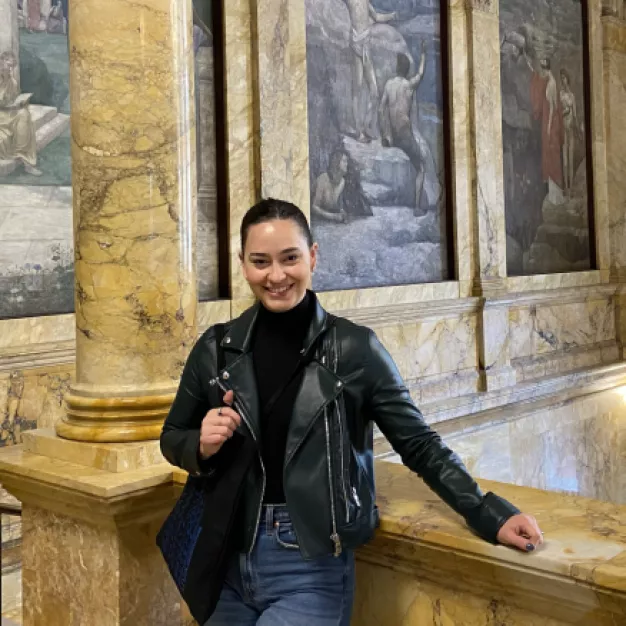Featured Fellow: Jamie Marsella (2023-2024 Eugene Garfield Short-Term Research Fellow)
The Library & Museum at the American Philosophical Society supports a diverse community of scholars working on a wide-range of projects in fields including early American history, history of science and technology, and Native American and Indigenous Studies, among others. Additional information about our fellowship programming and other funding opportunities can be found here.
Briefly describe your research project.
My dissertation aims to trace the spread of eugenic ideas in early 20th-century public health and child welfare programs. I focus on the New York City Babies Welfare Association (BWA), a federation of over 100 private philanthropic and religious organizations, created by Dr. Josephine Baker and the New York City Bureau of Child Hygiene. This association included local settlement houses, religious orphanages and day nurseries, education extension societies, clinical dispensaries, and educational clubs for children. In addition to their charitable missions, these organizations prioritized physical hygiene instruction as well as mental hygiene, moral hygiene, and sexual hygiene, drawing on popularized eugenic ideas.
Baker, for example, maintained direct engagement with mainline eugenics throughout her career and until her death in 1945. Her work shows us how eugenic ideas about the environment permeated child and maternal welfare discourses well beyond the first two decades of the 20th century. My project aims to provide a better understanding of how eugenic ideas—even those with competing logic—merged with ideas of social and moral worth during the first half of the 20th century.
What collections did you use while working at the APS?
I spent most of my time looking through the American Eugenics Society Records and the Charles Davenport papers. I was especially interested in examining the AES sermon contests in 1926 and 1928 and the public-facing magazine from the AES, Eugenical News.
I came to the American Philosophical Society hoping to learn more about the ways the mainline eugenics movement, particularly within AES-engaged maternal reformers and religious groups, helped garner public support for eugenic measures like immigration restriction, forced sterilization, and contraception. The AES was dedicated to converting regular laypeople to the cause of eugenics, and their records show a deep concern that the average person of “desirable stock” be made to feel an urgency to enact eugenic practices in their communities and in their own private lives. To this end, they hosted conferences and committees to attract key professions, published public-facing magazines and pamphlets for the average reader, and held Fitter Family and sermon contests across the country in the 1920s and 1930s.
What’s the most interesting or most exciting thing you found in the collections?
The AES sermon contests were especially exciting for my project. The contests awarded cash prizes for the best sermon on the topic of eugenics. The AES collections hold dozens of submissions from priests, rabbis, reverends, and pastors who sent manuscripts of sermons they delivered to their local congregations. As I reviewed these sermons, I was at first struck by the ways most of them referred to the same few eugenic narratives as examples. Yet what I was even more surprised by were the inconsistencies in how eugenics was defined, understood, and presented.
Do you have any tips or suggestions for future fellows or researchers?
Take advantage of all the opportunities to connect with the fellows, librarians, and archivists while you are in residence. The APS fellows have a wonderful opportunity to join a warm and welcoming community. My time chatting with other visiting fellows and librarians about their work and joining the Brown Bag lunches were the best parts of being in Philadelphia.
Any suggestions for must-see places or things to do in Philadelphia?
The pumpkin cakes at Dim Sum Garden in Chinatown are a must-eat!
Jamie Marsella is a doctoral candidate in the History of Science department at Harvard University. Her research focuses on the intersection between race, gender, and medicine in the development of women’s and children’s public health programming. Her dissertation is tentatively The New York City Babies’ Welfare Association: Religion and Eugenic Maternalism in Progressive Era Child Welfare Reform. It examines the role of domestic science education and public health programming in the New York City Babies’ Welfare Association (BWA), a city-wide preventative care network for women and children made up of hundreds of philanthropic, religious, and city-funded organizations. In treating child welfare reformers as public health workers, her dissertation demonstrates how euthenic thinking permeated public health programs for women and children, as well as the fluid barrier between public health programming and women’s domestic training.

